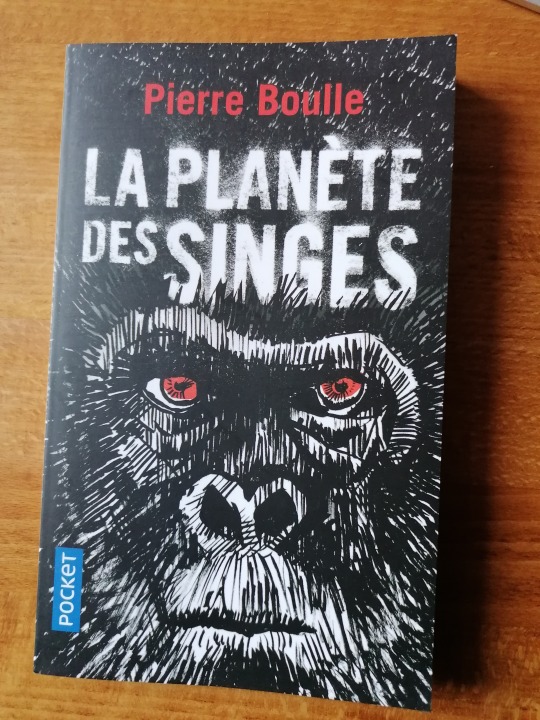#Pierre Boulle
Explore tagged Tumblr posts
Text
#marta kisiel#matt ruff#lovecraft country#louise l. hay#you can heal your life#stanisław bereś#stanisław lem#tako rzecze lem#so says lem#krystyna boglar#każdy pies ma dwa końce#every dog has two ends#liu cixin#death's end#pierre boulle#the planet of the apes#tetro tony#ambrosi giampiero#con/artist#books#book poll
7 notes
·
View notes
Text


spooky tuesday is a (now not so new!) podcast where we’re breaking down all of our favorite slashers, thrillers, monster movies and black comedies on the new scariest day of the week.
spookies, this latest theme month has been nearly a year in the making, which is why we're so excited to finally welcome you to PLANET OF THE APE-RIL. utilizing all five weeks of April, we're taking you on a journey through space, time, and one of last century's most famous (and political) scifi/horror franchises. starting with the first two movies in the original iteration — planet of the apes (1968) and beneath the planet of the apes (1970) — we're joined by special guest ashley reese as we travel to the far-off future and hold up a mirror to the not-so-distant past.
give spooky tuesday a listen on apple podcasts, spotify, iheart radio, or stitcher
#planet of the apes#beneath the planet of the apes#planet of the apes 1968#charlton heston#pierre boulle#rod serling#michael wilson#roddy mcdowall#kim hunter#linda harrison#maurice evans#james franciscus#paul dehn#arthur p jacobs#scifi movies#horror movies#horror podcast#horror movie podcast#horror#horror movie review#movie review podcast#spooky tuesday#new spooky tuesday episode
5 notes
·
View notes
Text
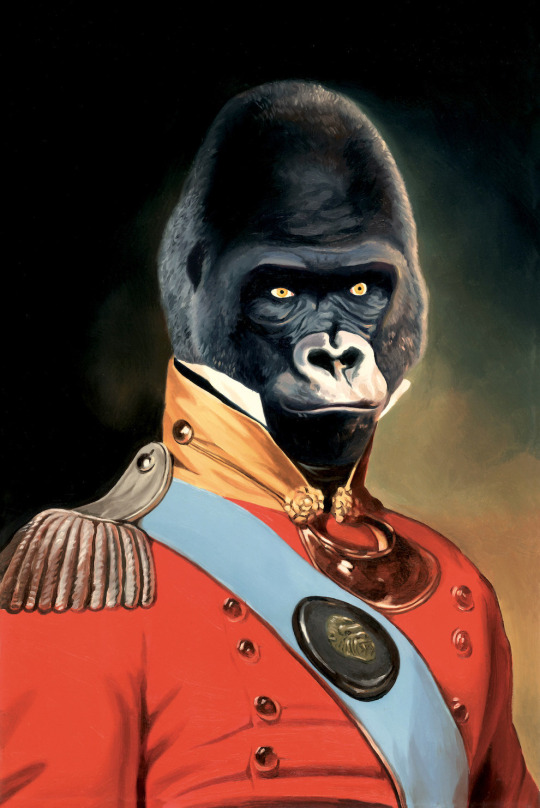
Planet of the Apes by Pierre Boulle Illustrated by David de las Heras (for The Folio Society)



In the original novel by Boulle, the ape society was at about the same stage as mid-20th Century Earth. Rod Serling’s original script for the movie was also set in the same era. But due to budgetary issues, the rewrite by Michael Wilson re-set it in a more primitive era.
30 notes
·
View notes
Text
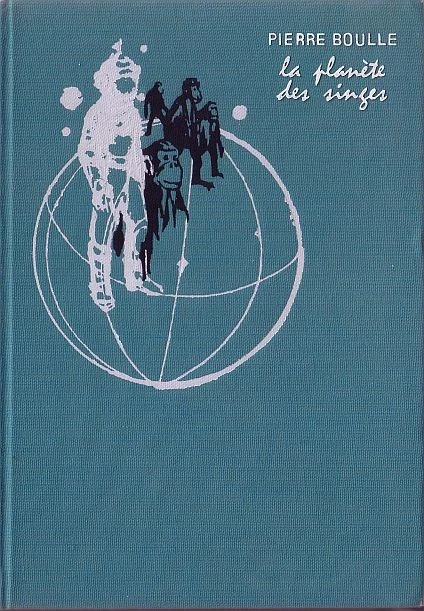
La Planète des Singes
Originally published in French in 1963, La Planète des Singes by Pierre Boulle was the origin of the Apes saga. 1971 French-language hardback edition published by GP pictured above.
10 notes
·
View notes
Text
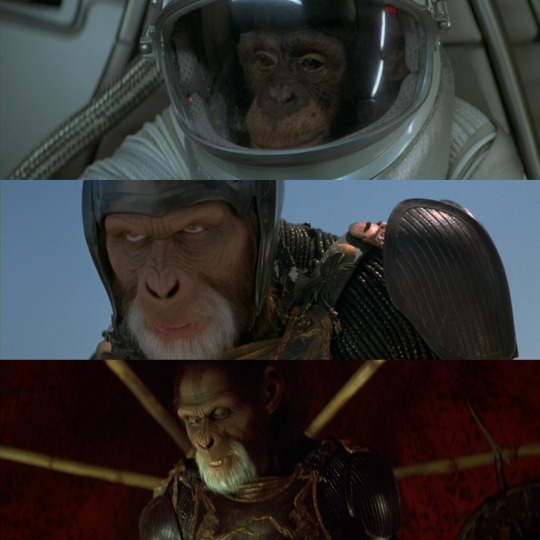
Planet of the Apes (2001, Tim Burton)
31/03/2024
Planet of the Apes is a 2001 film directed by Tim Burton.
It is a remake of the 1968 film of the same name, based on the novel Planet of the Apes (La Planète des singes) di Pierre Boulle.
In the year 2029, the daring astrounat Leo Davidson works in the Oberon space base in close contact with primates trained to carry out space missions; His favorite is Pericles, a chimpanzee. Once inside, Leo loses all contact with the Oberon and ends up crash-landing in the swamp of the alien planet of Ashlar, in the year 5021.
Leo will soon discover that this planet is populated by talking, evolved anthropomorphic apes who treat humans like slaves. The astrounat, captured by the apes, is later bought by a human trader named Limbo, a greedy and inept orangutan.
Due to a series of circumstances Leo manges to escape from prison and frees other humans and slaves, including the gorilla ex-soldier Krull, whose military career was destroyed by the evil general Thade, a chimpanzee, who manages the hunt to humans since the death of his father Zaius and is assisted by the ferocious gorilla Colonel Attar. The destination of the escape is "Calima", a sacred place for the monkeys, the temple of their god Seamus: according to their religion, in that place the god gave rise to the life of the monkeys.
In the finale, Leo reaches Earth in what he believes is his time, crashing near Washington. Walking inside the Lincoln Memorial, Leo is horrified to discover that the giant statue of the president possesses the face of General Thade.
The film came to light after a very intense development hell: ideas for a remake of Planet of the Apes date back to the 1980s, when Adam Rifkin was brought to 20th Century Fox studios with the desire to make a new film about apes. His film was to be called Return to the Planet of the Apes and described apes in Greco-Roman customs and habits fighting against a society of intelligent humans, the lineage of the protagonists of the 1968 classic, inspired by films such as Spartacus.
Peter Jackson later wanted to adapt a similar project in which the ape society was modeled after Renaissance culture and Roddy McDowall, the actor who had played Cornelius and Caesar in the original films, was open to the idea of having a part in the role of a monkey with an appearance inspired by Leonardo da Vinci. Jackson, however, dedicated himself to the creation of heavenly Creatures and only decided to resume the project in 1998, only to abandon it again when McDowall's death took away his enthusiasm.
#planet of the apes#film#2001#tim burton#Remake#1968#novel#pierre boulle#2029#space station#Pan#Marsh#Ape#orangutan#Gorilla#dr zaius#temple#earth#washington dc#lincoln memorial#development hell#adam rifkin#20th century studios#spartacus#peter jackson#renaissance#roddy mcdowall#leonardo da vinci#heavenly creatures#1998
10 notes
·
View notes
Text
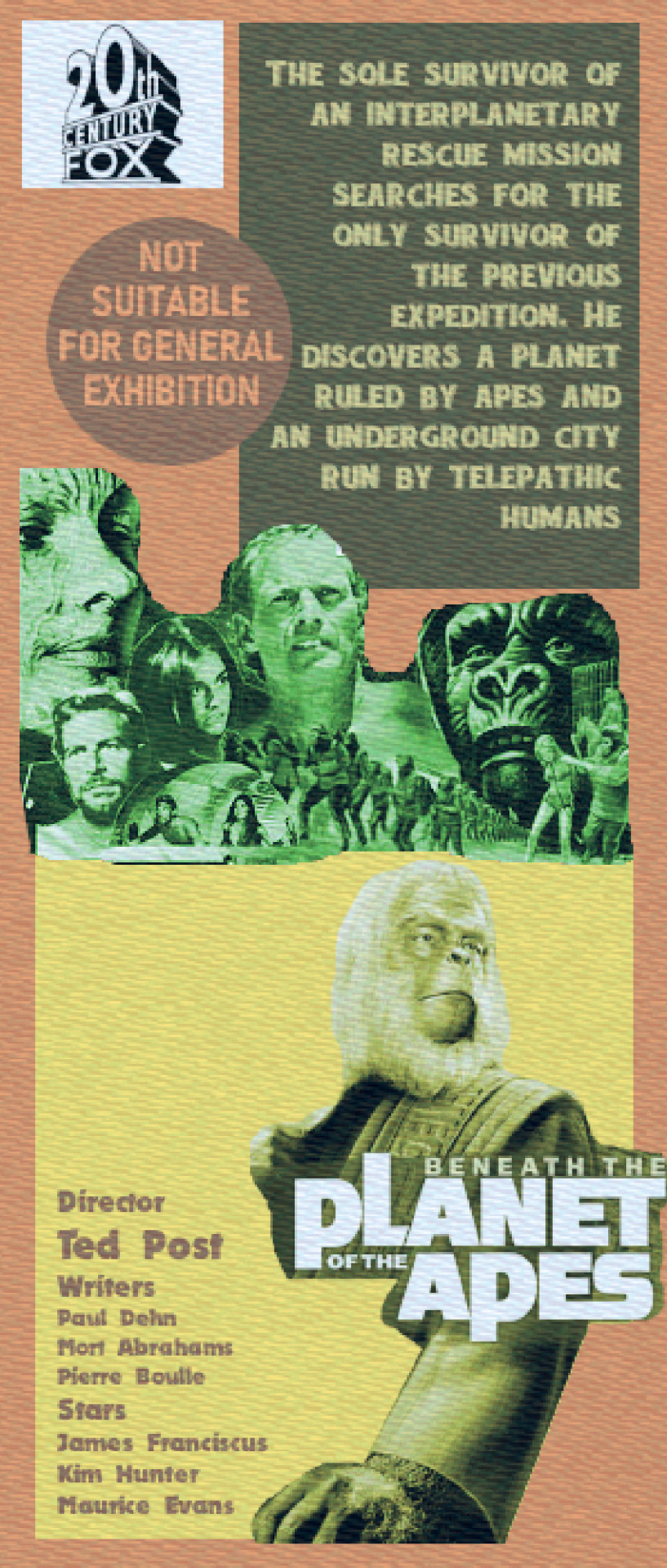
#beneath the planet of the apes#movies#ted post#paul dehn#mori abrahams#pierre boulle#james franciscus#kim hunter#maurice evans#illustration#vintage art#alternative movie posters
14 notes
·
View notes
Text
youtube
Planeta dos macacos (Planet of the apes, 1968) e as continuações que não aconteceram!
1 note
·
View note
Text
In 1982, all cats and dogs on Earth died due to some sort of plague. With the main pets now obsolete, humans began using apes as pets. ("Conquest of the Planet of the Apes", flm)
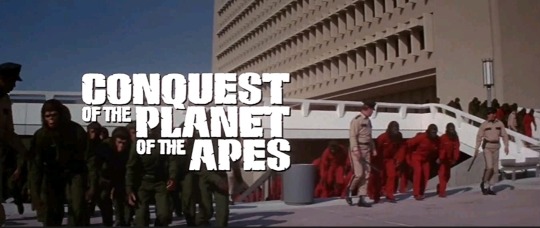
#nerds yearbook#1982#pandemic#plague#planet of the apes#conquest of the planet of the apes#paul dehn#pierre boulle#j lee thompson#roddy mcdowall#caesar#ricardo montalban#armando#natalie trundy#don murray#hari rhodes#severn darden#lou wagner#john randolph#asa maynor#h.m. wynant#david chow
9 notes
·
View notes
Text
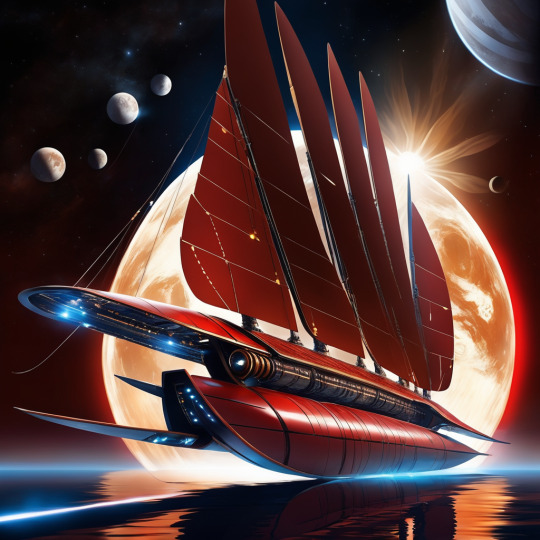
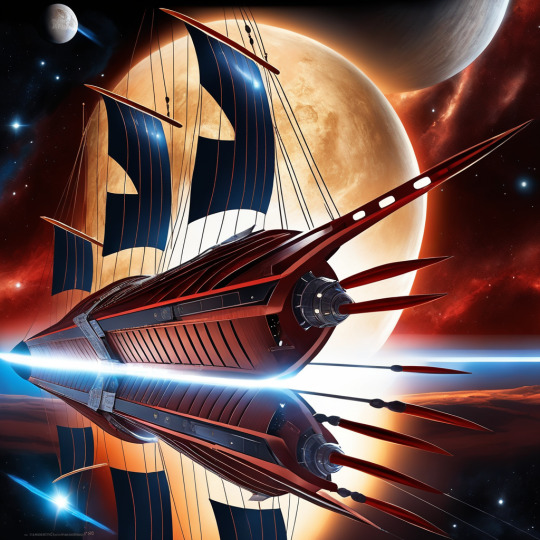
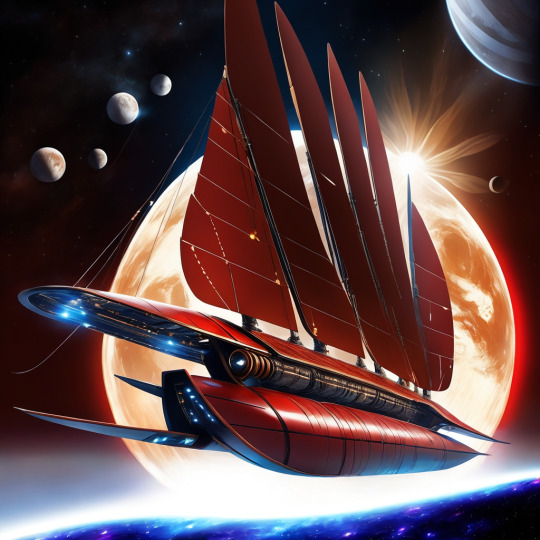
Sailing starship What if ?? Sailing boats became spaceships ? I tried to image what it would look like. The idea came from the begining of the book Planet of the Apes by Pierre Boulle (1963) where a sailing starship recover a bottle containing the story of a man which has landed on the Planet of the Apes.
SPOILER:
(it's funny because at the end, we discover that the peoples reading the story are Apes saying it's a fiction, it's not possible to have an intelligent human)
#stable diffusion#ai art#art#stablediffusionxl#sdxl#digital art#science fiction#scifi#Planet of the Apes#Pierre Boulle#Sailing starship#spaceship
2 notes
·
View notes
Text
Planet of the Apes (1968) : Movietalk # 05

This came out the same year as 2001: A Space Odyssey. Think about that. Two of the biggest, most highly influential pieces of American science fiction ever produced came out within a few months’ span of each other, and both of them just so happened to be evolved from involve apes. Between this and King Kong I believe Hanuman must’ve been watching over us all along, but this thought goes even further than that (though I will not forget to praise thee, o sweet sweet divine one). That Kubrick’s film, among its many frightening, man-dwarfing cosmic mysteries – created in part by a visionary often seen as more a cold, clinical, and sometimes even cynical type than he was anything resembling warmth – turned out to be one of the most life-affirming, optimistic and spiritually humorous films about humankind’s potential in space and beyond was certainly one thing… and it was quite another it would seem but a major exception at the time compared to this, a film which, with its strong and bitter nihilistic revelations, would not only influence a whole array of other dystopian downers to come (Logan’s Run, Soylent Green, A Boy and His Dog, Damnation Alley, just to name a few) but would also – if it still can be believed – spark an entire franchise (!!!) with the ongoing premise of humankind’s fallacies ever making way for the Ascension of the Great Apes and their Reign on Earth As It Was and As It Shall Ever Be under the banners of Great Ape Heaven.
But then again it was 1968, and America was far from its best (if it could ever be said it had one): we were committing massacres overseas, performing assassinations way back home, and in the midst of all the brutality and protests as the result we would then choose to elect the worst (now second-worst) most possible mound of despicable flesh to ever remain an infamous cancer in the public eye of the planet as president. With all that bad mojo going around it was no surprise that even the westerns had started to get the blues; how did noted director Sam Peckinpah become “Bloody Sam” Kill-em-all Peckinpah all the sudden? Well…
Perhaps what could best be said is that even in fiction we can’t let a good conflict down; hell, even when the American public had decided it was done making itself feel even more down in the dumps by watching another nuclear war apocalypse and instead went in droves to watch this really far-out pulp-tastic space fantasy that just came out, they still inevitably chose to watch a war movie. Yet that could also be further explained by the fact that this time, the good guys were gonna win (oh yes! you betcha ass!) the good guys were gonna take out the oppressive empire, impress the cute girl, and get a gold medal they could chew on the way back home in one fell swoop. After all, it’s always the easiest to withstand any conflict – no matter how devastating or horrific – as long as you know right away the cards will always be held in your favor: things may be tense at times (a bit iffy, a little bumpy, to put it lightly) but at least there would be the certainty they’ll get the job done and get it done right so you could rest at ease to tell your friends all about it over brunch the next day. But that’s just the movies, and because it’s the movies these things often turn themselves back around even when unintended. I guess I was always curious why they called it Star Wars in the first place when they were like, waging one? Now we don’t have to be concerned anymore. We don’t have to worry.
Of course, you could possibly lead this to an argument about how most of these films and TV shows and whatnot of the Kenner ilk have more or less this hopeful spin, this liberating message of persistence and collective strength against the great powers that be assigned to kill us all this time, and I wouldn’t be so inclined to deny it outright (I’d likely get what you were cooking at if you knew how to sauce it)… yet at the same time I don’t feel quite the same of that as I do for, say, more out-there semi-fantasies like anything from the Ultraman or, hell, the Kamen Rider series; they at least feel truer, more closer to the heart, y’know? They have their charms and wonders, yes – anything committed to the art of tokusatsu mustn’t be devoid of either-or to begin with, of course! – yet even in their most friendliest of visages there is more often than not an understanding of cruelty and malice beneath its villains and struggles, a grounded meaning of evil we can not only know in full but then be able to confront it and fight it to its utter end. George Lucas may’ve inserted World War II to Star Wars through the vast array of dime-a-pop war movies and periodical space epics of his childhood, and he may’ve taken the loose-from-reality adventurous spirits those stories held of themselves down to a tee, but at the end of the day it was still WWII, the war to end no wars... which wouldn’t be such a big deal if it had at any point sternly (and truly) acknowledged the graveness and weight that beheld that conflict through any of its creative impulses. Yet they tried… oh by golly did they try – they attempted it first with The Empire Strikes Back where they really put the opera in space opera by making our characters grow (then escalate) further into their worries and doubts and, in some cases, their inner darknesses with immeasurable success; and Lucas himself had single-handedly tried to make catharsis with the then-current tides of early 2000s America with the tremendous misfired oddity that keeps on giving of the Prequel Trilogy – yet even when they had it good there was always this knee-jerk reaction... the major step back... the retreat to Square Oneas if the series just so happened to possess by default a complete nervous system reactant to any sort of change or disturbance that dared touch or look its folds the wrong way, crushing any intruders good or bad to bits and sweeping its messes right under the bed as if to say, We’re always gonna have wars and we’re always gonna be happy about it, damn you! Damn you all to hell!
Now isn’t that just grand? We were supposed to have some fun and now we’re back to feeling as blue as Christmas (way to go brainiac, check out the smarts on you dipshit). Come on, let’s knock the bullshit and go play some tag, let’s chase each other out on the monkey bars over on the big toy, let’s play Starship Cowboys and ride the swings and see how high we can go see how far we can jump without scraping our knees and elbows and after that let’s watch Planet of the Apes yeeaaah Planet of the Apes now that’s a fun movie you know the one with the people wearing the goofy monkey suits and the fake rubber noses I mean that’s just crazy now look look at em go look at em swinging those sticks and riding their horses and shooting their guns and shit ain’t that funny I mean what were they on drugs when they made this I mean what a dumb fucking idea right haha.
“Smile.”
#planet of the apes#pota#franklin j. schaffner#pierre boulle#movies#consider the following#movietalk#more to come
0 notes
Text




youtube
The Bridge on the River Kwai (1957)
My rating: 6/10
You know, it occurs to me that war might be, generally speaking, kind of a bad time for all involved.
#The Bridge on the River Kwai#David Lean#Pierre Boulle#Carl Foreman#Michael Wilson#William Holden#Alec Guinness#Jack Hawkins#Youtube
1 note
·
View note
Text


Plaque en hommage à : Pierre Boulle
Type : Lieu de résidence
Adresse : 18 rue Duret, 75016 Paris, France
Date de pose : 12 octobre 2002 [source]
Texte : Dans cet immeuble a vécu l'écrivain Pierre Boulle de 1956 à 1994
Quelques précisions : Pierre Boulle (1912-1994) est un écrivain français, principalement connu aujourd'hui comme l'auteur de La Planète des Singes (1963), roman de science-fiction à l'origine d'une série de films à succès. Avant d'embrasser cette carrière littéraire, il combat pendant la Seconde Guerre mondiale, une expérience qui servira d'inspiration plusieurs de ses œuvres. Il est considéré comme l'un des fondateurs de la science-fiction française, auteur de plusieurs nouvelles et romans, et reçoit, en 1976, le grand prix de la Société des gens de lettres.
0 notes
Text

Return to the Planet of the Apes was a 1975 animated television series based on the 1968 film Planet of the Apes and its sequels and the nivel based on the 1963 novel by Pierre Boulle.









8 notes
·
View notes
Text
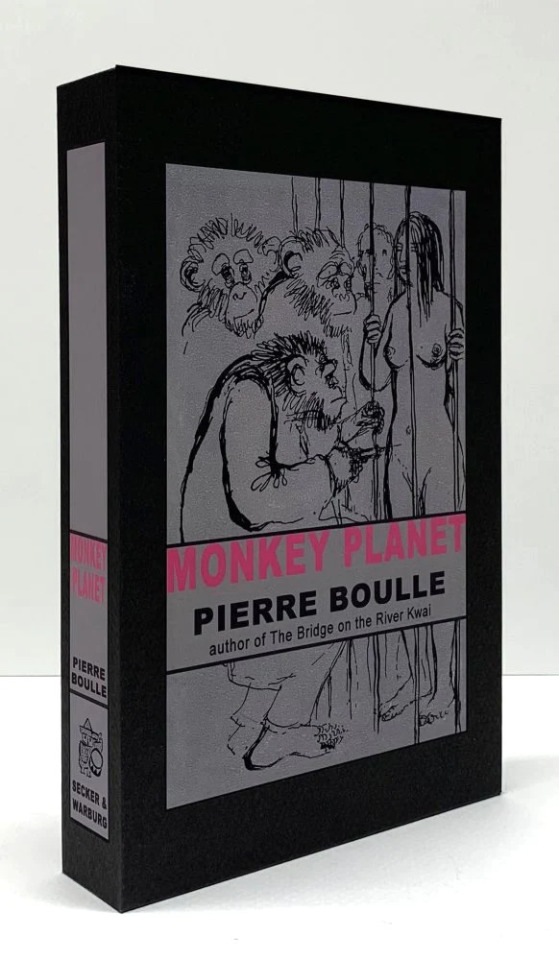

Pierre Boulle
Monkey Planet
Beautiful custom-made slipcase for the first UK edition.
11 notes
·
View notes
Text
Kingdom of the Planet of the Apes: (Review)
Kingdom of the Planet of the Apes tries to add a layer to the existing franchise. Clans who have never heard of Caesar. Apes who do not know the real creed of the original leader. The film does do a certain amount of credit to the original and the new franchise starting with the 2011 re-imagining of the ape world. The original, co-written by the master of quirky and thoughtful material Rod…
#Amanda Silver#Charlton Heston#Freya Allan#Josh Friedman#Kevin Durand#Michael Wilson#Owen Teague#Pete Macon#Pierre Boulle#Rick Jaffa#Rod Serling#Wes Gall#William H Macy
1 note
·
View note
